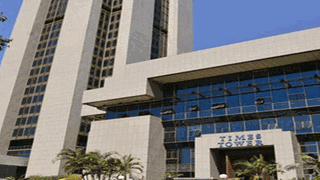
Times Tower, Kenya Revenue Authority headquarters in Nairobi.
| File | Nation Media GroupNews
Premium
Inside Uhuru’s Sh620 billion tax waivers to multinationals
British multinational currency printer De La Rue, alcoholic drinks manufacturer Kenya Breweries Limited (KBL) and Moja Expressway are among the companies that have benefited from over Sh620 billion in tax waivers granted by former President Uhuru Kenyatta’s administration.
The Kenya Revenue Authority (KRA) protested at former National Treasury Cabinet Secretary Ukur Yatani's decision to grant tax breaks and incentives amounting to Sh620,483,364,867, according to revelations made before the Finance and National Planning Committee.
The taxman has since cancelled the tax waivers granted to De La Rue, KBL, National Commercial Bank of Africa (NCBA), London Distillers Kenya (LDK), Maendelo Ya Wanawake Oganisation (MYWO) and the Ministry of Information and Communication Technology (ICT), KRA acting Commissioner-General Rispah Simiyu told the lawmakers.
Treasury waived Sh11.7 billion in taxes owed by KBL, Sh8.2 billion by De La Rue, Sh976 billion by NCBA, and Sh529.3 million by London Distillers.
The ICT ministry owed Sh1.9 billion for fibre optic cables laid by Chinese firm Huawei while MYWO owed Sh38.5 million after successfully lobbying Treasury to scrap pay-as-you-earn (Paye) tax.
Over the five-year period, KRA waived Sh48.9 billion in value added tax (VAT), Sh279.2 billion in customs exemptions, Sh20 billion in three cases of domestic excise duty waivers, Sh47.7 billion in Treasury tax commitments, and Sh7.1 billion in tax and customs waivers.
"Between January 2018 and February 2023, KRA approved waivers totalling Sh566,206,978 while Treasury approved waivers totalling Sh4,047,358,819," Ms Simiyu said.
She said the law allows a taxpayer to write to the KRA seeking tax waivers or exemptions whereupon the Treasury cabinet secretary can grant a waiver upon KRA’s recommendation.
Former KRA commissioner-general Githii Mburu, who resigned in February, wrote a letter of protest to Mr Yatani warning of instances where some taxpayers apply directly to Treasury for consideration of waivers of penalties and interest as well as abandonment of tax and Treasury considers these applications without the involvement of KRA.
“This does not give KRA the critical role of ensuring that the taxpayer meets the necessary requirements to be granted a waiver and also ensuring that the level of waiver is commensurate with the assessment template,” Mr Mburu wrote in a letter to Mr Yatani dated November 5, 2022.
“It is also our view that the law requires the KRA to consider applications for tax waivers and exemptions and make appropriate decisions and recommendations to the National Treasury in accordance with the law.”
Also Read: Court setback for Uhuru tax waivers
Mr Mburu said the KRA was concerned about the increasing number of cases where the National Treasury had undertaken to pay taxes on behalf of certain taxpayers, but said taxes remained unpaid for periods as far back as 2014/2015, leading to audit queries.
He cited the Ministry of ICT where KRA has enforced the payment of Sh1.95 billion tax where the ministry failed to withhold and remit tax from Huawei Technologies Ltd. The tax payment relates to the construction of the Konza Technopolis.
"Our understanding of section 33 is that the role of considering and approving payment plans rests with the commissioner. With respect to waiver applications, the commissioner may consider waiver of penalties and interest of less than Sh1.5 million without reference to the cabinet secretary," Mr Mburu told Mr Yatani.
"This means that all applications for exemption should be made to the Commissioner in the first instance. However, this was not followed in the case of Red Court Hotel".
Red Court Hotel, which operates under the Boma Hotel brand, self-assessed a cumulative tax bill of Sh598 million. In 2020, Boma Hotel asked Treasury for a three-year grace period to raise money to pay the taxes in 10 years.
“In our opinion, the taxes should have been paid to the KRA but the taxpayers, which included De La rue, KBL and NCBA, bypassed us and went to the Treasury cabinet secretary for tax waivers," said Ms Simiyu.





